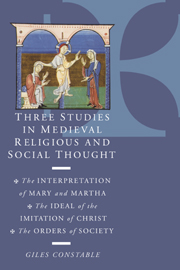 Three Studies in Medieval Religious and Social Thought
Three Studies in Medieval Religious and Social Thought Book contents
- Frontmatter
- Contents
- List of illustrations
- Preface
- List of abbreviations
- I THE INTERPRETATION OF MARY AND MARTHA
- The sisters together
- The sisters distinguished
- The sisters apart
- II THE IDEAL OF THE IMITATION OF CHRIST
- III THE ORDERS OF SOCIETY
- Bibliography of secondary works
- Index of manuscripts
- Biblical index
- General index
The sisters distinguished
Published online by Cambridge University Press: 08 December 2009
- Frontmatter
- Contents
- List of illustrations
- Preface
- List of abbreviations
- I THE INTERPRETATION OF MARY AND MARTHA
- The sisters together
- The sisters distinguished
- The sisters apart
- II THE IDEAL OF THE IMITATION OF CHRIST
- III THE ORDERS OF SOCIETY
- Bibliography of secondary works
- Index of manuscripts
- Biblical index
- General index
Summary
three main lines of interpretation of Mary and Martha can be distinguished in the twelfth century and the later Middle Ages. They all had roots in the past and sometimes overlapped, even in the works of the same author, but they became increasingly distinct and reflected some of the major spiritual trends of the period. First was the traditional stress on the combination and interaction of contemplation and action in this life; second was the tendency to separate the two types of life and to identify each with different groups of people and social functions on earth; third was the emerging view, of which the beginnings have already been seen in the eleventh century, which exalted Martha's role of action in the world and deprecated Mary's part of withdrawal and contemplation and at the same time endowed each sister with distinctive qualities. Martha stood for service to others, works of mercy, and good housekeeping, while Mary was associated not only with contemplation and the life of prayer and withdrawal from the world but also, as Mary Magdalen, with repentance and reform and, later, with ministering to Christ. According to a French sermon preserved in a thirteenth-century manuscript, she was ‘the glorious sinner’, whose hair showed her abundance or excess, and the preachers Ralph Ardens and Peter Comestor, respectively, called her ‘the penitent sinner’ and said that her tears, foot-kissing, and anointing of feet and head were marks of her conversion from an evil heart, mouth, and deed. The traditional symbiosis between the two sisters thus broke down, and each acquired her own characteristics, legend, and liturgical cult.
- Type
- Chapter
- Information
- Three Studies in Medieval Religious and Social ThoughtThe Interpretation of Mary and Martha, the Ideal of the Imitation of Christ, the Orders of Society, pp. 44 - 92Publisher: Cambridge University PressPrint publication year: 1995


